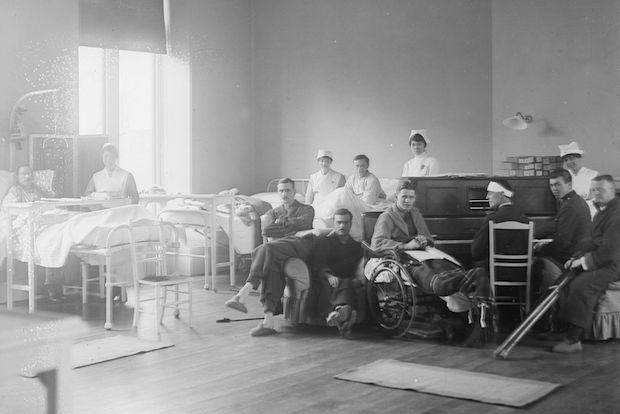From The Spectator, 31 October 1914:
THE following are extracts from the diary kept by a Red Cross probationer this autumn:
Tuesday—A rumour has gone about that we are to have wounded here one day this week. I wonder! Instead of dusting, I polished all the twenty electric-light switches all round the ward this morning, besides doing the taps. Far more amusing than dusting and much better exercise.
Wednesday—One of the patients—No. 8—ran quite a bad temperature to-day, and seemed in great pain. It was wretched to see him suffer; he seems unable to eat or sleep, and gets no rest from his pain. Such a wet day! For the first time we got soaked coming home. Our bicycle lamps threw a little circle of light which only served to show how fast it rained, and showed us our way so little that I twice nearly rode into the ditch. These uniform coats keep out the rain pretty well, but they don’t button far enough down for bicycling. Fortunately I possessed a safety-pin.
Thursday—Poor No. 8 is worse to-day and begging for his “injection.” Sister and I had the most painful half-hour with him that I think I have ever spent. His treatment caused him very acute pain, and somehow, poor wretch, it seemed to take twice as long as usual to-day. He never ceased to beg Sister to stop, to let him have a moment’s rest, to “have a little mercy.” By the time it was over he was utterly exhausted. It wrung one’s heart, and I fancy that it was all Sister could do to go on. It was dreadful to keep urging platitudes about its being “all for his good” to a creature in such agony.
Friday—The wounded are coming to-morrow. Twenty of them. They are to be drafts from a military hospital, and will be convalescent. Such a flutter in the dovecote, with a cleaning of sinks and of brass, and a preparation of dressings, and a replenishing of medicine bottles! Jane, who is in the women’s ward, affects a great superiority. Turns up her nose, and remarks that she for one is not going to run after the military. She supposes that we shall entirely neglect the old patients now. I conveyed a suitable reply to her. To our great relief, No. 8 is a little better.
The coming of the wounded is noised all over the village. Jane and I were closely cross-questioned about them by our host at dinner this evening at The Feathers. The attitude of the people at the inn has throughout been rather diverting. The waitress, chambermaid, and cook have been extraordinarily kind and attentive, never jibbing at a half-past six breakfast, or a nine o’clock dinner, and providing glorious hot baths at night. But it is quite plain that they regard us as the strangest of zoological specimens, and are consumed with curiosity as to how we spend our days. They know that we go to the hospital —our original information and the uniform told them that— but they long to know further. They watch us eat with great interest, and the waitress asks innumerable leading questions. Our fellow-guests obviously consider that our presence—or rather the presence of our uniforms—adds distinctly to the interest of existence. So appropriate in war time, you know! We consider that we cast a halo of topicality.
Saturday—They—the wounded—arrived at about four o’clock. We set them down to a gigantic tea. There were boiled eggs, there was jam; I and the other pros staggered under the most enormous jugs of tea, and grew feverish in our efforts to keep up the supplies of bread and butter. There were eight stretcher cases, among them a charming bugler, who sat up in bed and did wool work. “Have you broken your leg?” I ask one of them as I undressed him. I suppose that my tone must have been unconsciously condescending, for he instantly rapped out, “Compound fracture of the tibia, Sister.” They call us all Sister, I discover. Not apparently —as in the out-patients’ department of a hospital where I once worked—from a desire to flatter, but from a habit they get into at the military hospitals.
Sunday—The men were excellent about helping with the work this morning. Such a stream of people come to see them in the afternoon! We were simply inundated by people bringing cigarettes, flowers, sweets, and fruit. We—the staff— rather looked down upon all these enthusiastic females. But the patients thoroughly enjoyed it. I think that the bugler will be sick to-morrow in consequence of the number of acid-drops he has eaten. When all the visitors had gone, we had a service in the ward.





Comments